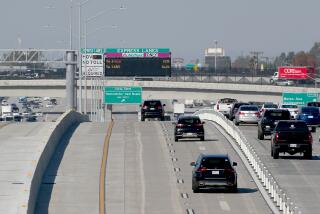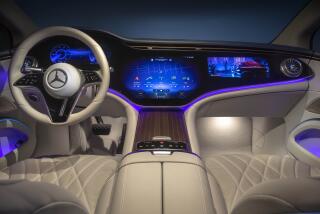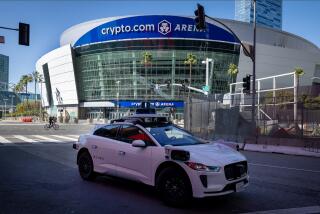Los Angeles Auto Show embraces the future, folding Connected Car Expo into main show
Undergoing an aggressive revamp to prepare for an autonomous-driving future, the Los Angeles Auto Show is eliminating its Connected Car Expo and replacing it with a new pre-show designed to better bridge automakers and technology companies.
When the L.A. Auto Show takes place this fall, it will be preceded by AutoMobility LA, which will fold in elements of the Connected Car Expo into the traditional media and trade days for “one schedule, one brand, one show,” said the event’s Brendan Flynn.
Kicking off Monday, Nov. 14, with opening ceremonies and a cocktail party, AutoMobility LA’s next three days will include panels, conferences, test drives and demonstrations -- and the car displays that have been the L.A. Auto Show’s centerpiece since it was founded in 1907.
The 10-day auto show that will follow AutoMobility LA will be unchanged.
The idea of folding the 4-year-old Connected Car Expo into the traditional media and trade days that precede the auto show’s public days has been in the works for several years. The expo, Flynn said, was never intended to be a permanent, standalone event; it was a bridge to the just-announced arrangement.
“We saw all these ‘mobility suppliers,’ like Microsoft, Qualcomm or Intel, registering for our press days,” Flynn said. “They were all telling us, ‘We want to reach the automakers.’ Meanwhile, automakers were starting to go to the CES [the Consumer Electronics Show in Las Vegas] and South by Southwest to meet tech companies.”
Half a decade ago, Flynn said, tech companies and automakers were only talking about infotainment matters -- getting navigation or entertainment options inside the automobile. Now, with the prospect of autonomous or driverless cars approaching, automakers’ need for more technology has increased exponentially.
“The whole model had changed,” Flynn said. “The automakers realized they had to collaborate.”
Participating companies appear to be responding. Flynn said the show will double the number of exhibitors next year.
“It’s great that L.A. Auto Show is taking a leadership position in making this a critical aspect of the show,” said Jim Taylor of the electric car company Karma Automotive. “Connectivity is one of the most sought-after subjects in the automotive industry today and will play an important role in how the industry evolves.”
Los Angeles has become “the new epicenter for auto technology,” Flynn said, with Tesla just up the road in Silicon Valley and future-looking companies such as Faraday Future, Karma and NextEV opening offices or building factories in Southern California.
“It just seemed to us that the discussion should happen here,” Flynn said. “Los Angeles is a place where ideas are born.”
Broadening the show in this manner will require an increase in its physical footprint. To that end, AutoMobility LA is to include a 50,000-square-foot “Technology Pavilion,” a temporary structure that will be erected in the Gilbert Lindsay Plaza adjacent to the Los Angeles Convention Center, where the auto show is held. Climate-controlled and custom-floored, the structure will be leased by AutoMobility and stored between annual shows.
The new event will also feature “Go,” an ongoing showcase inside the 760,000-square-foot convention center for mobility devices including hoverboards, skateboards, surfboards, electric bicycles and “rocket skates,” as well as online apps such as Uber, Lyft, Honk, Luxe and Metromile.
Ford Motor Co. President and Chief Executive Mark Fields is to be the keynote speaker.
“We are expanding our business to be both an auto and a mobility company, and our focus remains on making people’s lives better by changing the way the world moves,” a Ford spokeswoman said. “It’s great to see so many others join the effort to reimagine mobility and how it shapes consumers’ lives in California and beyond.”
Bigger changes may have to wait until the convention center gets bigger. Flynn said the auto show organizers have had to turn away certain car companies, and turn down requests for more floor space from companies already participating, because there simply isn’t room.
“Tesla and Faraday wanted to exhibit, but only if they could be in the main hall -- and it’s full,” Flynn said.
Last fall, the L.A. Auto Show attracted 22,000 visitors to its media and trade days, and more than 900,000 to the trade show. The final Connected Car Expo booked 2,400 registered participants.







